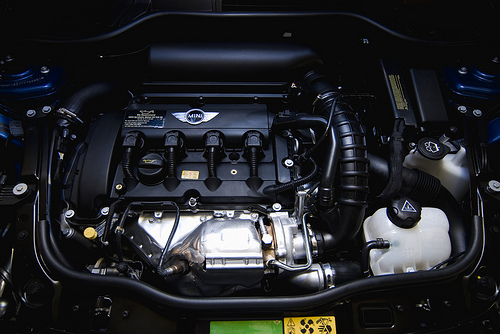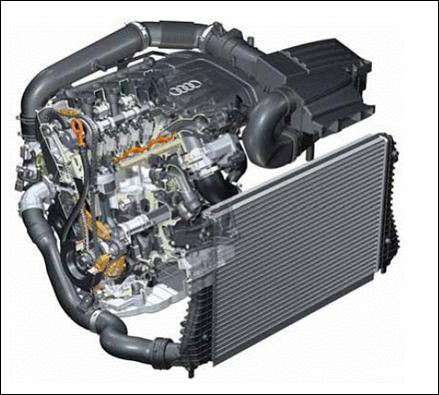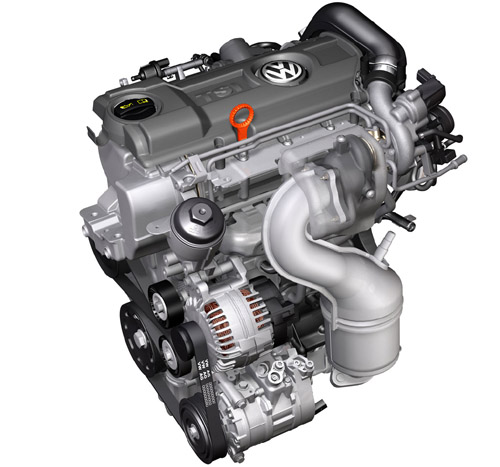International Engine of the Year 2009
Best New Engine of the Year
The category of newcomer engines, which included two from BMW was won by Porsche with their new 3.8-litre naturally aspirated flat six. It is rated at an impressive 385bhp max power, but that was not the factor that clinched its award. What impressed the judges most was how Porsche also got the engine to sip less fuel than its predecessor.
According to Marc Noordeloos of Automobile magazine, “Leave it to Porsche to build a near-400bhp engine that returns such impressive fuel economy. Enthusiasts should take comfort in the fact that the naturally aspirated engine may not be dying after all.”
Porsche attributes the impressive economy of this engine to the fact that it uses direct injection, brought over from the Cayenne. That, and a 200cc increase in engine capacity saw the 3.8 gain a healthy 30bhp over the outgoing 3.6 but emit 15% less CO2.
| Results | ||||||||||||||||||||||||||
|
Green Engine of the Year
VW introduced the 1.4-litre twincharged EA111 engine back in 2006, but today the engine is still good enough to fend off challenges from Mercedes and BMW diesels in addition to hybrids from Honda and Ford.
The 1.3-litre IMA from Honda pushed it real close, but ultimately lost out because of its massive power deficit in comparison to the TSI, which can be tuned to output as much as 178bhp.
FC and emission figures ultimately clinched it for the VW. When used in the Golf, the TSI emits 144 grams of CO2 for every kilometre traveled and consumes 6.2 litres of petrol for every one hundred. The Insight betters both these figures, but falls way short of the TSI’s impressive power output.
| Results | ||||||||||||||||||||||||||
|
Best Performance Engine
Taking the title of the Best Performance Engine is none other than the famous 6.2-litre V8 M156 of Mercedes-AMG, which powers everything currently slapped with the 63 AMG badge.
This naturally aspirated high-revver (7,200rpm redline) had to beat two BMW engines, and one each from Jaguar, Porsche and Ferrari to claim its prize.
| Results | ||||||||||||||||||||||||||
|

Best Performance Engine: Mercedes-AMG M156 6.2 V8.
Sub 1-litre
The Sub 1-litre category is actually the best place for Japanese manufacturers to cari makan in these awards. As the Europeans tend to look at the bigger capacities, it leaves room for the Japanese to attack this segment unhindered.
Look no further, the only Japanese winner in this year’s award is here – Toyota’s 1.0-litre three-cylinder 1 KR-FE, which it also shares with the PSA Group. After narrowly winning this segment last year, the three-potter returned to trounce smart’s 799cc diesel into a distant second place.
| Results | ||||||||||||||||||||||||||
|
1-litre to 1.4-litre
The 1.0-1.4 segment sees a VW one-two finish, with two of its 1.4 TSI powerplants occupying the top two berths in this category. The very same engine that took home the Green Engine of the Year award, the EA111, now bags the 1.0-1.4 category as well.
| Results | ||||||||||||||||||||||||||
|
1.4-litre to 1.8-litre
A piece of news that is certain to excite our 308 forummers in Autoworld, the turbocharged version BMW-PSA Prince 1.6-litre engine under their hoods havs won this segment for the third year running, comfortably beating the Toyota Prius 1.8-litre hybrid.
For this award, the version of the engine tested churned 175hp of power and 260Nm of torque, which is the specification level for the 308 GT and the Mini Cooper S.
Third place is taken by another engine that has also seen a reasonable amount of action in Malaysia, Audi’s 1.8-litre TFSI found in the likes of the A4, TT, Skoda Superb and VW Passat.
| Results | |||||||||||||||||||||||||
|

1.4-litre to 1.8-litre: BMW-PSA Prince
1.8-litre to 2.0-litre
Last year’s winner of the 1.8-2.0 category, Audi’s EA 113 2.0-litre TFSI engine, was finally deposed of its crown, ironically by its successor, the EA 888, another 2.0-litre TFSI engine available in power outputs ranging from 178 to 208bhp, and capable of up to 350Nm of torque.
The EA113, meanwhile, occupies third place, with the BMW N47 2.0-litre twin-turbo diesel of the 123d sits between the two Audi powerplants at second. A special mention goes to Subaru for having its first diesel engine even nominated in the category.
| Results | ||||||||||||||||||||||||||
|

1.8-litre to 2.0-litre: Audi EA888 2.0 TFSI
2.0-litre to 2.5-litre
Winning in the 2.0-2.5 category was the new 2.1-litre diesel from Mercedes-Benz introduced in the W212 E-class. Featuring twin-turbos, piezo-electric direct injection, Stuttgart’s latest oil-burner is available in three states of tune – 134bhp, 168bhp and 201bhp.
In second place is the 2.5-litre five-pot motor found in the Audi TT RS, recently previewed here in Autoworld Blog, capable of producing 340bhp and 450Nm. Also among the nominees, but finishing last, is the Honda 2.4-litre K24 engine, which in Malaysia’s market sees action in the Accord and Odyssey.
| Results | |||||||||||||||||||||||||
|
2.5-litre to 3.0-litre
Here is a category dominated by BMW for the past three years. Two time overall winner of the International Engine of the Year Award (in 2007 and 2008), the BMW N54B30 3.0-litre direct injection twin turbo engine continues to dominate this category for the third year running.
The N54 was BMW’s first turbocharged petrol engine since 1980, but it certainly was worth the wait. Lag free turbo response ensures a healthy 302bhp on tap with 400Nm of peak torque available pretty much all the time.
A distant second is another BMW 3.0-litre twin turbo engine, but a diesel powered variant, one that has seen action in the 335d, 535d, 635d, X3, X5 and X6, the M57. In the 35d state of tune, this engine outputs 282hp peak power and a whopping 580Nm of peak torque.
| Results | ||||||||||||||||||||||||||
|

2.5-litre to 3.0-litre: NMW N54
3.0-litre to 4.0-litre
After being upstaged by the Mercedes-AMG 6.2-litre monster in the Best Performance Engine category, the S65B40 4.0-litre V8 of the BMW M3 redeems some pride by comfortably beating two Porsche 3.8-litre flat six engines to take the 3-to-4 litre category.
Producing 414bhp at its 8,250rpm redline, the S65 replaces the highly successful S54B32 of the E46 M3. The S54 has left a tough act to follow, having walloped this category for no less than six times during its career. For the S65, this is its second victory in this category after winning it in 2008, ensuring BMW’s continued dominance in this segment.
| Results | ||||||||||||||||||||||||||
|

3.0-litre to 4.0-litre: BMW S65B40
Above 4.0-litre
Mercedes and AMG reassume centerstage for the Above-4 category, with the 6.2 V8 M156 returning to shrug off challenges from two BMW powerplants, a Jag, a Cadillac, and a somewhat darkhorse in the form of a Lexus hybrid.
| Results | ||||||||||||||||||||||||||
|
INTERNATIONAL ENGINE OF THE YEAR 2009
After deciding the respective categories, judges then form a shortlist from the winner of each category to ultimately decide the winner of the International Engine of the Year award.
For 2009, the tiny 1.4-litre EA111 TSI powerplant from Volkswagen took on defeated the mighty N54 from BMW, ending the Bavarians’ four-year monopoly of the top prize. It wasn’t easy for the little guy though, as the defending champion fought it all the way, in the end losing only by four judging points.
| Results | ||||||||||||||||||||
|



























The results for this year Engine of the Year Awards should be subjected to severe auditing from independent sources.
I will only name 1 category where the results are simply outrageous to an extent far beyond comprehension: The Green Engine award.
The jury had several cars to choose from, and two nominees were the VW TSI and the new Prius 3G (3rd generation).
Having:
The VW with 174 hp, 6.2 L/100 km and 144 g/km CO2;
The Toyota with 136 hp, 3.9 L/100 km and 89 g/km CO2
The jury says the car which has:
+30% horsepower, 63% more fuel consumption, 62% more CO2 emissions
is the greenest car… yeah… right… is this for real!?!?!
The general public demands a general inquiry to this Jury votes right now!
This is a shameful representation of how strong lobbies can go.
I feel sick to the stomach reading this year’s awards.
Shame on the jury.
I hope you keep up with posting more great blog posts like this one. I will subscribe to your rss feed to keep up to date.
Whats up, this was a really high-quality article. I’d like to blog like this also – taking time and real effort to make a good article… but what can I say… I very busy and never seem to get something done.